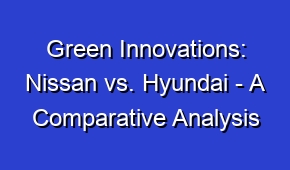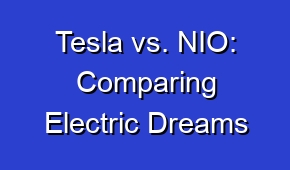Green Innovations: Nissan vs. Hyundai – A Comparative Analysis

Discover the latest green innovations from two automotive giants: Nissan and Hyundai. In this article, we compare the eco-friendly technologies and initiatives implemented by both companies, highlighting their efforts to reduce carbon emissions and promote sustainability in the automotive industry. Explore how Nissan and Hyundai are leading the way in creating a greener future.
When it comes to green innovations, Nissan and Hyundai are leading the way in the automotive industry. Both companies have made significant strides in developing eco-friendly technologies and sustainable solutions for their vehicles. Nissan’s electric vehicles such as the Leaf have gained popularity for their zero-emission capabilities, while Hyundai has introduced its own line of electric and hybrid cars like the Ioniq and Kona Electric. These environmentally-friendly options not only reduce carbon emissions but also offer cost savings for drivers in terms of fuel efficiency. In addition to their electric offerings, both Nissan and Hyundai have invested in clean energy initiatives and are actively working towards reducing their overall environmental impact. As the demand for greener transportation continues to grow, Nissan and Hyundai are positioning themselves as frontrunners in the race for sustainable mobility.
| Nissan and Hyundai are leading the way in green innovations in the automotive industry. |
| Nissan has introduced electric vehicles like the Leaf to reduce carbon emissions. |
| Hyundai has developed the Ioniq, a hybrid vehicle that combines gasoline and electric power. |
| Nissan is focused on sustainable mobility solutions with their e-Power technology. |
| Hyundai is investing in hydrogen fuel cell technology for their eco-friendly vehicles. |
- The Nissan Leaf is one of the best-selling electric cars globally.
- Hyundai’s Ioniq Electric offers a long driving range and fast charging capabilities.
- Nissan’s ProPILOT Assist system provides semi-autonomous driving features for enhanced efficiency.
- Hyundai’s Blue Link app allows remote monitoring and control of their electric vehicles.
- Nissan’s e-Pedal technology enables one-pedal driving, enhancing energy efficiency.
What are the green innovations in Nissan vehicles?
Green innovations in Nissan vehicles refer to the environmentally friendly technologies and features implemented by the company. Nissan has been at the forefront of electric vehicle (EV) development with its popular model, the Nissan Leaf. The Leaf is a fully electric car that produces zero emissions, helping to reduce air pollution and dependence on fossil fuels. Additionally, Nissan has implemented regenerative braking systems in their vehicles, which help to recapture and store energy that would otherwise be lost during braking.
| Electric Vehicles | Solar Panel Integration | Regenerative Braking |
| Nissan offers a range of electric vehicles that produce zero tailpipe emissions. | Some Nissan vehicles have solar panels integrated into their design to help power auxiliary systems. | Nissan vehicles utilize regenerative braking technology, which recovers energy during braking and stores it for later use. |
| These vehicles can be charged at home or at public charging stations, reducing reliance on fossil fuels. | The solar panels generate electricity to power features such as air conditioning, headlights, and audio systems. | This technology improves fuel efficiency and reduces emissions by converting kinetic energy into electrical energy. |
| They offer a sustainable transportation solution with lower environmental impact. | By harnessing solar energy, these vehicles reduce the need for traditional electrical charging. | Regenerative braking also helps extend the range of electric vehicles. |
What are the green innovations in Hyundai vehicles?
Green innovations in Hyundai vehicles include various technologies and features aimed at reducing environmental impact. Hyundai has also made significant advancements in electric vehicle technology, with models like the Hyundai Kona Electric and Hyundai Ioniq Electric. These vehicles offer zero-emission driving and have impressive ranges on a single charge. Hyundai has also incorporated hybrid and plug-in hybrid options into their lineup, providing consumers with more fuel-efficient alternatives. Additionally, Hyundai has focused on improving overall fuel efficiency in their conventional gasoline-powered vehicles through engine advancements and aerodynamic designs.
- Hyundai offers a range of hybrid and electric vehicles, such as the Hyundai Ioniq Electric and the Hyundai Kona Electric, which produce zero emissions and reduce the carbon footprint.
- Hyundai has implemented eco-friendly materials in its vehicles, such as soy-based foams and bio-fabrics, reducing the use of petroleum-based materials and minimizing environmental impact.
- Hyundai has introduced solar roof systems in some of its vehicles, such as the Hyundai Sonata Hybrid, which harness solar energy to charge the battery and increase fuel efficiency, reducing the reliance on fossil fuels.
How do Nissan’s green innovations contribute to sustainability?
Nissan’s green innovations play a crucial role in promoting sustainability. By producing electric vehicles like the Nissan Leaf, the company helps reduce greenhouse gas emissions and air pollution associated with traditional gasoline-powered cars. Electric vehicles also help decrease dependence on fossil fuels, as they can be charged using renewable energy sources such as solar or wind power. Furthermore, Nissan’s regenerative braking system allows for more efficient energy use, maximizing the range of electric vehicles. These efforts contribute to a more sustainable transportation sector and help combat climate change.
- Nissan’s electric vehicles: Nissan has been a pioneer in developing electric vehicles (EVs) such as the Nissan LEAF. These EVs produce zero tailpipe emissions, reducing air pollution and greenhouse gas emissions.
- Regenerative braking technology: Nissan has implemented regenerative braking technology in their vehicles. This technology converts the kinetic energy produced during braking into electricity, which is then used to charge the vehicle’s battery. This reduces energy wastage and increases the efficiency of the vehicle.
- Solar energy: Nissan has integrated solar energy into their sustainability efforts. They have developed solar panels that can be installed on the rooftops of their EVs, allowing them to charge using renewable energy sources.
- Vehicle-to-Grid (V2G) technology: Nissan has introduced V2G technology, which allows EVs to not only consume energy but also supply it back to the grid. This enables the EVs to act as mobile energy storage units, helping to stabilize the grid and support the integration of renewable energy sources.
- Recycling and reuse: Nissan is committed to reducing waste and promoting recycling. They actively recycle materials used in their vehicles, such as steel, aluminum, and plastics. They also encourage the reuse of parts and components, reducing the need for new production and minimizing resource consumption.
How do Hyundai’s green innovations contribute to sustainability?
Hyundai’s commitment to green innovations contributes to sustainability in several ways. By offering electric vehicles like the Hyundai Kona Electric and Hyundai Ioniq Electric, the company helps reduce greenhouse gas emissions and air pollution. These vehicles provide zero-emission transportation options and help decrease reliance on fossil fuels. Hyundai’s hybrid and plug-in hybrid models also contribute to sustainability by improving fuel efficiency and reducing overall carbon emissions. Additionally, Hyundai’s focus on aerodynamic designs and engine advancements in their conventional vehicles helps enhance fuel efficiency and reduce environmental impact.
| Hyundai’s Green Innovations | Contribution to Sustainability |
| Electric Vehicles (EVs) | Reduces greenhouse gas emissions and dependence on fossil fuels. |
| Hybrid Vehicles | Improves fuel efficiency and reduces CO2 emissions. |
| Hydrogen Fuel Cell Vehicles | Produces zero-emission vehicles and promotes clean energy. |
Which company, Nissan or Hyundai, has more advanced green innovations?
Both Nissan and Hyundai have made significant strides in implementing green innovations in their vehicles. Nissan is widely recognized for its leadership in electric vehicle technology, particularly with the Nissan Leaf. The Leaf has been a popular choice among electric vehicle enthusiasts and has played a crucial role in promoting EV adoption worldwide. On the other hand, Hyundai has also made notable advancements with models like the Hyundai Kona Electric and Hyundai Ioniq Electric, offering competitive ranges and features. Ultimately, determining which company has more advanced green innovations may depend on specific criteria or individual preferences.
Nissan has more advanced green innovations compared to Hyundai.
What are the benefits of Nissan’s green innovations?
Nissan’s green innovations offer several benefits to both consumers and the environment. Electric vehicles like the Nissan Leaf contribute to cleaner air quality by producing zero tailpipe emissions. They also provide a quieter driving experience compared to traditional gasoline-powered cars. Additionally, Nissan’s regenerative braking system helps improve energy efficiency and extends the range of electric vehicles. By reducing dependence on fossil fuels, Nissan’s green innovations contribute to energy diversification and help combat climate change. Moreover, owning an electric vehicle can lead to long-term cost savings due to lower fuel and maintenance expenses.
Nissan’s green innovations offer benefits such as reduced emissions, improved fuel efficiency, and a smaller carbon footprint.
What are the benefits of Hyundai’s green innovations?
Hyundai’s commitment to green innovations offers numerous benefits to consumers and the environment. Electric vehicles like the Hyundai Kona Electric and Hyundai Ioniq Electric provide zero-emission driving, reducing air pollution and greenhouse gas emissions. They also offer the convenience of home charging and potential cost savings on fuel. Hyundai’s hybrid and plug-in hybrid models provide a more fuel-efficient alternative for those who require longer driving ranges. Additionally, Hyundai’s focus on improving fuel efficiency in their conventional vehicles helps reduce carbon emissions and decrease overall environmental impact.
Reduced Environmental Impact
Hyundai’s green innovations, such as the development of electric and hybrid vehicles, contribute to reducing the environmental impact of transportation. These vehicles produce lower emissions compared to traditional gasoline-powered cars, thus helping to decrease air pollution and combat climate change. Additionally, Hyundai’s eco-friendly manufacturing processes aim to minimize waste and conserve natural resources.
Lower Fuel Costs
Hyundai’s green innovations, particularly their electric and hybrid models, offer significant fuel efficiency. These vehicles are designed to maximize energy usage, resulting in lower fuel consumption and subsequently reduced fuel costs for the owners. This not only benefits the individual drivers but also helps to reduce dependence on fossil fuels and promote energy sustainability.
Incentives and Tax Credits
Many governments and regions around the world provide incentives and tax credits for purchasing eco-friendly vehicles. Hyundai’s green innovations allow customers to take advantage of these benefits. By opting for a Hyundai electric or hybrid vehicle, owners may qualify for various incentives such as tax credits, rebates, or reduced registration fees. These financial incentives can make owning a Hyundai green vehicle more affordable and encourage a wider adoption of sustainable transportation options.





















